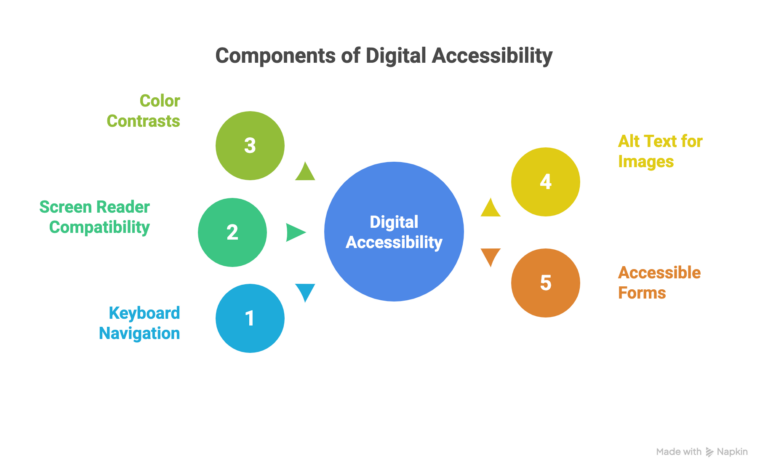Greetings! I'm Aneesh Sreedharan, CEO of 2Hats Logic Solutions. At 2Hats Logic Solutions, we are dedicated to providing technical expertise and resolving your concerns in the world of technology. Our blog page serves as a resource where we share insights and experiences, offering valuable perspectives on your queries.

E-commerce businesses are now operating under the European Accessibility Act (EAA), which took effect on June 28, 2025. With the compliance deadline now passed, many companies are either catching up on requirements or optimizing their accessibility implementations.
2Hats Logic specializes in transforming regulatory challenges into competitive advantages, helping companies implement accessibility solutions that drive both compliance and business growth.
What is the European Accessibility Act?
The European Accessibility Act is the EU’s commitment to digital equality. It requires businesses to make digital products and services accessible to people with disabilities, especially for e-commerce: websites, mobile apps, and checkout processes must be usable by people with visual, auditory, motor, or cognitive impairments. The standard referenced is WCAG 2.1 Level AA, the globally acknowledged accessibility requirement.
Warning: Failure to meet EAA compliance may result in fines, removal of goods/services, or even litigation. These penalties will apply to all businesses selling to EU consumers, regardless of physical location.
Who Needs to Comply?
Not limited to EU-based companies: If you sell to EU customers, regardless of company HQ (Headquarters), you must comply.
Exempt: Only micro-enterprises (fewer than 10 employees, under €2 million turnover) may be exempt
Pro-tip: Start with an accessibility audit today. Waiting until 2025 puts your brand at risk and increases rushed development costs.
How Is E-Commerce Changing?
These new regulations will transform every touchpoint of the online shopping experience, from browsing to checkout.
1. Website & Mobile App
Your e-commerce site must support:

- Keyboard navigation
- Screen reader compatibility
- Proper color contrasts
- Alt text for all images
- Accessible forms and error messaging
2. Accessible Checkout
- Payment options compatible with assistive technologies
- Transparent error feedback
- Progress indicators throughout checkout
- Multiple payment options suitable for diverse users
3. Product Information
- Clear descriptions with semantic HTML headings and structure
- Schema markup to help assistive technologies understand page content
Pro-tip: Use automated tools like WAVE and Google Lighthouse for regular accessibility checks during development.
Evaluate your website’s readiness for the European Accessibility Act.
The Business Case
Market reach: 87 million EU citizens have disabilities; their spending power is over €3 trillion
SEO: Accessibility enhancements can boost organic search results and user engagement
User experience: Accessibility features (better contrast, clear navigation) improve usability for all customers
Pro-tip: Accessibility is not just compliance, it’s a brand reputation boost. Make it part of your customer experience strategy.
Step-by-Step Guide
- Use tools like WAVE, axe DevTools, NVDA, and WebAIM
- Fix heading structures, image alt text, and keyboard navigation
- Rewrite product content in plain language
- Get real feedback from users with disabilities
- Train staff to maintain accessibility best practices
Ready to make your platform accessible?
Common Compliance Mistakes to Avoid
- Treating accessibility as an afterthought – Build it into your design process from day one
- Relying solely on automated testing – Real user feedback is irreplaceable
- Focusing only on technical compliance – Consider the actual user experience
- Ignoring mobile accessibility – Many assistive technology users rely on mobile devices
The Competitive Advantage
While your competitors scramble to meet the June 2025 deadline, early adopters are already reaping benefits. Companies that embrace online accessibility regulations proactively often see:
- Improved brand reputation and customer loyalty
- Reduced legal risk and compliance costs
- Better SEO performance and organic traffic
- Enhanced user experience leading to higher conversion rates
Looking Beyond 2025
The European Accessibility Act is just the beginning. Similar legislation is emerging globally; the US has the ADA, Canada has AODA, and Australia has DDA. By building accessibility into your core business practices now, you’re future-proofing your e-commerce operation for international expansion.
Conclusion
Start with an accessibility audit, prioritize high-impact fixes, and gradually build accessibility into your development workflow.
Remember, WCAG compliance in e-commerce isn’t just about meeting legal requirements; it’s about creating inclusive experiences that serve all your customers better. In a world where customer experience is the ultimate differentiator, accessibility might just be your secret weapon.
Ready to make your e-commerce platform accessible? Start with a comprehensive accessibility audit.
FAQ
What is the European Accessibility Act (EAA) and how does it affect e-commerce websites?
The EAA requires online stores in the EU to make websites accessible to people with disabilities. By 2025, e-commerce sites must meet digital accessibility standards like screen reader support and easy navigation.
Which accessibility features should online stores implement to comply with the EAA?
Key features include alt text for images, keyboard-friendly navigation, readable fonts, proper contrast, and an accessible checkout process.
Why is accessibility important for e-commerce growth in 2025?
Accessible e-commerce improves inclusivity, boosts SEO, and meets legal requirements, helping stores reach more customers and build trust.

Related Articles







